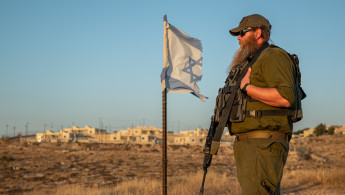Palestinian boy, 15, survives kidnap and torture by settlers in Masafer Yatta
Salama Makhamra, 15, barely escaped with his life on Tuesday night after being abducted and tortured by Israeli settlers in Masafer Yatta in the occupied West Bank.
Salama had gone to collect water from the village's well when he was kidnapped and beaten by three settlers from the nearby Havat Ma'on outpost before managing to escape, his father Kayd Makhamra, told The New Arab's Arabic-language sister edition Al-Araby Al-Jadeed.
While settler attacks have surged across the occupied West Bank since Israel's assault on Gaza began last October, violent settlers have increasingly targeted Palestinian farmers with impunity, and often with the participation of the Israeli army.
The residents of Masafer Yatta, however, have endured intense Israeli state and settler violence for decades, ever since Israel declared part of the region a closed military zone in the 1980s.
The incident falls into a continuous series of assaults on the Palestinian residents of rural Bedouin communities in the South Hebron hills – but what particularly scares residents is the increasing targeting of children.
"If we were not living on our own land, we would have left it, because our life has not been normal for about a year now," said Kayd.
Kidnap and torture
Kayd relayed how Salama hadn't returned after going to the nearby well on Tuesday evening to collect drinking water, since there was no running water in their village of Maghayir al-'Abid - one of the 19 Palestinian hamlets that make up Masafer Yatta.
The family started to worry about his absence when they noticed a lot of "commotion" among the settlers in the Havat Ma'on outpost, situated a few hundred metres from Maghayir al-'Abid.
After growing increasingly anxious, "We saw him approaching, at a late hour, from the direction where the settlers' cars were gathered. He showed signs of beating and abuse," Kayd said.
"We tried to find out what had happened, but he was in shock and couldn't speak or express what had happened to him," Kayd added.
Minutes later, Salama fainted, and his family rushed him to the Yatta public hospital in Hebron.
Salama had bruises "all over his body" and was in a deep state of shock and fear – which was so extreme that "the doctors were unable to do a blood test", his father said.
Hours later, once the shock subsided, Salama recounted how three settlers had grabbed him near the well and had put him in a car with blacked-out windows, before driving him to a tent, not far from the village.
Then they started beating him and threatening to kill him, and were making phone calls, which he didn't understand but felt they were planning to take him somewhere far away.
However, after a few hours, the settlers went outside the tent to do something, and Salama managed to escape, according to his father.
Salama has not been able to sleep since the incident, which affected him psychologically much more than physically, said Kayd, adding that the family went to file a legal complaint at the Israeli police station but the Israeli police didn't act, saying there were no photographic documents proving the incident.
Kayd said on Wednesday the same settlers had set up a roadblock and stopped the bus taking the children to their school, terrorising the children with their weapons and warning the driver not to use that route again.
He said the official Palestinian bodies should provide peoples' protection and resistance committees to protect the residents – otherwise, they remained in danger which could result in deaths.
Maghayir al-'Abid – steadfast despite harassment
The Maghayir al-'Abid hamlet is made up of some of the oldest ruins (khirbes) in Masafer Yatta. Around 50 Palestinians live there in tents, tin sheds, and caves.
They refuse to leave their land despite the lack of basic amenities and depend on raising livestock and farming for their livelihoods.
Head of the Masafer Yatta village council head, Nidal Abu Aram said they have monitored no less than 20 attacks every month against children in the ruins and villages of Masafer Yatta.
The types of attacks vary between "chasing them around their homes, preventing them from grazing their sheep and collecting water, stopping them getting to school, kidnappings and beatings and threatening to kill them," he says.
Even worse, he adds, since October 7 of last year, the settlers have established seven new settler outposts, from pastoral outposts to random tents - in which more than 150 settlers are living, and their daily mission appears to be persecuting the local people, and their children in particular.
"What is most frightening is that the settlers in Masafer Yatta are considered the most extreme," says Abu Aram.
"They're thugs with weapons who ride motorbikes and bikes and chase and kidnap children, threatening their lives."
This is an edited translation from our Arabic edition.





![Both Hamas and the Palestinian Authority welcomed the ICC arrest warrants [Getty]](/sites/default/files/styles/image_330x185/public/2024-11/GettyImages-2178351173.jpg?h=199d8c1f&itok=TV858iVg)

